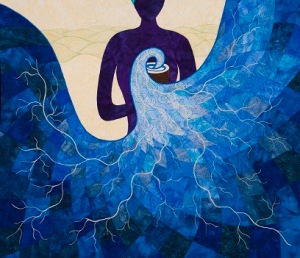Exploring the Word:
Sermon – May 10th 2015
6th Sunday of Easter
By Roland Legge
Acts 10:44-48
Psalm 981 John 5:1-6 John 15:9-17
Now, imagine that you grew up as a Jew. You have been taught that you are the chosen ones of God. Many have told you that the Jews are the only ones to receive salvation. This can be comforting if all your friends and family are Jews. However, if you had some good Gentile friends this may feel very uncomfortable.
Can you imagine the inner turmoil that Peter and Philip were facing as God was calling upon them to baptize Gentiles? This went against all they had been taught. So it took some work by the Holy Spirit to open their hearts in ways they had never experienced before. They got to the point they couldn’t find any good excuse to prevent a Gentile from being baptized. Peter proclaimed and I quote from Chapter 10:47 of Acts:
“Can anyone withhold the water for baptizing these people who have received the Holy Spirit just as we have?” 10:48 So he ordered them to be baptized in the name of Jesus Christ. Then they invited him to stay for several days.
As this was repeated over and over again it became obvious to these early followers of Jesus that the Gentiles also were part of God’s great family.
Putting down others who are different from us seems to be a common human trait. Thinking our religion or other set up beliefs is the ultimate truth is another destructive tendency that we humans have. In our modern times the welcoming of the Gentiles makes sense. But still too often our own prejudices get in the way.
Have you ever been told that you are not a proper Christian? It is not pleasant to be told that you are a leading people away from God when you know you are trying your best to show God’s love. I have had people tell me that since I am a member of the United Church I am not a proper Christian. What really makes us a person of faith? Who can decide if we are? I believe only God/Spirit can know this.
I am sad when people use individual texts to justify their particular beliefs especially when they are using it to put the faith of another down. You can misuse the Bible to justify just about anything. Do we own slaves because the Bible tells us it is okay? I don’t think so!
In our Gospel reading we are called to love each other as friends. I now quote from Acts 15:12
“This is my commandment, that you love one another as I have loved you.
15:13 No one has greater love than this, to lay down one’s life for one’s friends. 15:14 You are my friends if you do what I command you.
This is where the Religious Society of Friends got its name from, the denomination I grew up in. I believe the Spirit calls upon us to build friendship with everyone we meet. We are to be open to the divine, loving and just qualities in people no matter how similar or different we are.
None of us have been given the responsibility to decide who is good or bad. Each of us are to be the best persons we can be. As followers of Jesus our job is pass on the love of the Spirit to bring the best out in each of us. We must walk our talk.
The Good News for me, is that it is through love, we all have been claimed for the Spirit. Even our worst enemies have been claimed by God. Our job is to be faithful and not worry about the other person unless they are abusing someone. I mean hurting or teaching hatred and/or intolerance. I don’t mean worrying about whether their dogma is right especially if they are a loving and a compassionate person in the world.
In Saskatchewan we now live in a multi faith world. We have people practicing traditional aboriginal spirituality, we have practicing Muslims, and we have practicing Bahia’s. We also have people of the Jewish faith, Hindu faith, Sikh faith, and many who have no particular faith. We are still learning to get along with each other. Then we have our problems right within Christianity where there is too much disharmony. I believe God wants us to be friends with each other. There are so many struggles in our world that we need people of faith coming together to work for the betterment of the world.
I have been blessed to have been part of Ministerial associations in small towns across the prairies and northern Ontario who have brought faith leaders together from a wide range of churches from liberal to conservative. I have come to have great appreciation for my evangelical friends. I remember one minister from the Alliance Church complaining that they could not keep older people. I reminded him that we had the opposite challenge in the United Church of Canada where we struggle to attract young people. We both laughed!
In our association I valued the open conversation about our faith knowing that our friendship could not be threatened by our differences. I also appreciated the opportunity to reflect on my own faith. We found so much we could work together on because were able to respect and love each other despite our differences. In our little groups we truly became friends!
Think of all the disputes that could be resolved if we were open to experiencing the grace of God through many different people, especially the people who are the most different. Just think of what could happen in our country if we could build friendships with our aboriginal brothers and sisters and our Muslim brothers and sisters. We would no longer fear each other because we would discover that each of these people are not a lot different than us. The love of another person is no different whether or not they are Christian or not. For love is love.
No one has all the answers to faith questions. Sometimes there are no answers. When I share a message with you these are only my understandings. I hope and pray that as you listen to me and yourself you will discern for yourself your own beliefs and even more importantly how you are going to live them out in the world.

